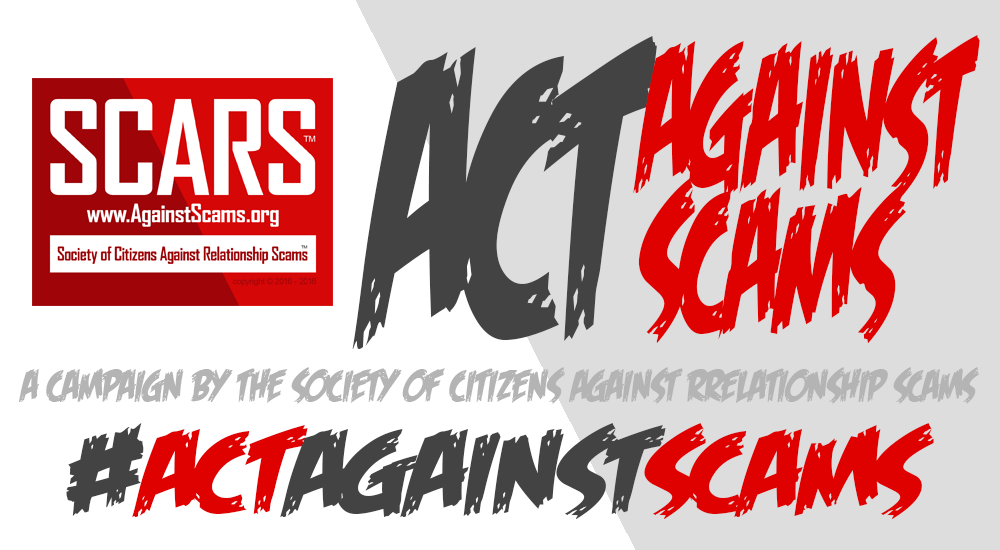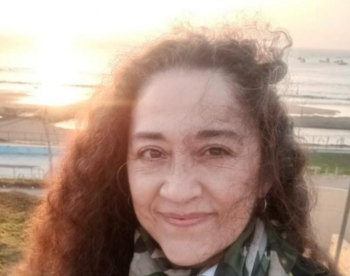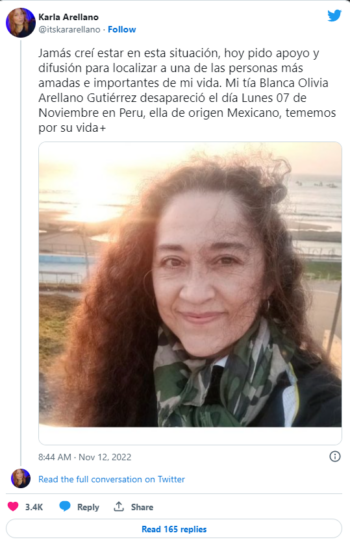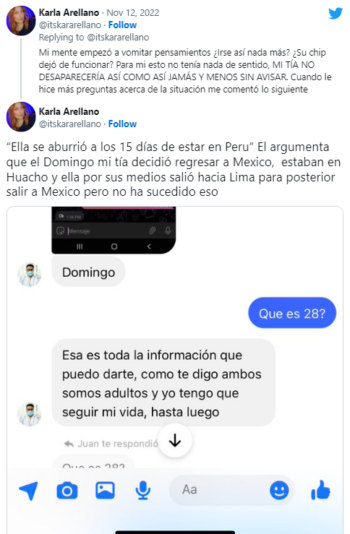
SCARS Institute’s Encyclopedia of Scams™ Published Continuously for 25 Years

A Mexican Woman Flew 3,000 Miles To Meet Online “Boyfriend” Before Being Murdered For Her Organs
A Truly Terrible Story About An Online Victim Traveling To Meet A Stranger
This is NOT a Story About How Online Dating Goes Bad! This is a Story About Victims Lured By Online Criminals!
The news media talk about this like it is the romantic pursuits of a 51-year-old woman that saw her travel 3,000 miles from her home in Mexico for a date in Peru took a nightmarish turn after her dismembered body washed up on a beach. But this is far from that. This was a wilful deception to lure a victim to her death!
NEVER TRAVEL TO MEET A STRANGER YOU ONLY KNOW ONLINE!
Blanca Arellano told her family at the end of July that she would be taking a trip to Lima, where she planned to finally meet Juan Pablo Jesús Villafuerte, the man she’d been in an online courtship with for several months, in person.
Her family said that Arellano was planning to visit the beach city of Huacho, where her 37-year-old Peruvian boyfriend lived, and that remained to be the story they believed until they stopped hearing from her on 7 November.
In that final call with her niece, Karla Arellano, the 51-year-old hadn’t raised any red flags that would give her relative any cause for concern. She told her that the online relationship had proved to be standing the tests of an in-person one and that she had even developed feelings of love for the man she had previously only known behind the screen of her laptop, according to authorities.
Weeks went by before Arellano’s dream vacation to meet her so-called “love” was revealed to be a terrifying scheme, one that left the Mexican woman’s family frantically searching for her – only to have their own worst nightmare confirmed.
If it hadn’t been for the efforts of the 51-year-old’s social media-savvy niece, the case perhaps wouldn’t have gained the initial notoriety she managed to capture, as her posts about her missing aunt racked up hundreds of likes, retweets, and comments.
SCARS NOTE: this is a good example of how family and friends can help play a significant role in advocating for victims, even when it is not this bad!
“I never thought I would be in this situation, but today I’m asking for your support to spread this post and find one of the most loved and important people of my life. My aunt Blanca Olivia Arellano Gutiérrez disappeared on Monday November 07 in Peru. We fear for her life,” the niece said in her 12 November post read.
The younger Ms. Arellano said in the posts that she’d begun to have misgivings about the medical student her aunt had met in an online gambling forum after a conversation with him in November revealed that the pair had fallen out and his ex-lover, he claimed, had said she was traveling back to Mexico.
“I decided to communicate with Juan P since he was the only contact she had in that country and that is where our fear was triggered,” she wrote in a follow-up post to her Twitter thread on her aunt’s disappearance.
“Is she ok?” asked the desperate niece, emphasizing in her series of posts how Villafuerte was the only person in the country who her aunt knew.
The medical student responded by saying that he’d stopped talking to Arellano several days before and that she’d told him that she was catching a plane back to Mexico after deciding, he claimed, “I couldn’t offer the life she wanted”.
The niece noted in her posts how this behavior was extremely uncharacteristic of her aunt, as she “WOULD NOT DISAPPEAR JUST LIKE THAT EVER AND EVEN LESS WITHOUT WARNING.”
“Juan P is the only contact we have and he is the last person to see my Aunt Blanca alive, until now he has not wanted to cooperate with information that could facilitate his search and today,” she added in one of the follow-up posts.
For his part, Villafuerte told the younger Ms. Arellano that he had done his “role” but from here on out, he could no longer assist the family in locating their missing relative, claiming that he didn’t “know anything else from here and I’m saying this with sadness”.
“Take care and I hope she gets safe back home,” the 37-year-old said in his last text exchange with the family.
Soon after, Peruvian authorities launched an investigation into the missing Mexican woman after her niece’s posts began gaining more traction online.
On 10 November, the grisly discovery of a severed finger with a silver ring still attached confirmed the worst for Arellano’s family.
Though the identifying fingertips had been removed, according to investigators, the family was able to match it to their missing relative with the silver ring, which they knew Arellano wore.
In the days that followed, more unsavory discoveries began washing up on the same beach in Huacho, including a faceless head, an arm and then finally a torso with all the internal organs seemingly intentionally excised from the chamber.
An arrest warrant was issued for Villafuerte on 17 November, and he was taken in as the main suspect in Arellano’s homicide investigation.
“Juan Pablo Villafuerte was arrested on charges of human organ trafficking,” said Peru’s general attorney in a news conference on Monday, according to Latin Noticias.
In a terrifying revelation that only came to light days after the 37-year-old medical student’s arrest, Villafuerte had allegedly begun posting videos on TikTok shortly after Arellano’s disappearance that appeared to show him dissecting human organs, including a pancreas and a brain, El Popular reported.
While searching the suspected murderer’s home, investigators then also found evidence of blood spattering throughout his apartment, including in the bathroom, the laundry room, and on the mattress and cleaning supplies, El Pais reported.
“We have no words to express what we are experiencing,” her niece tweeted on Wednesday. “My aunt was a kind, warm person, full of light, intelligent, dedicated, loving and that is how she should be remembered.”
SCARS SUMMARY:
This is just one example of how horror can happen to people who fall in love online and then go to visit the stranger!
Organ Harvesting is big business in many parts of the world, especially Latin America where many doctors and medical professionals ask few questions and just take the money. There are several large organizations in Brazil, Venezuela, Colombia, and elsewhere involved in this trade. For them, it is safer to take a tourist than a local person.
We constantly urge and advise people online to never go to visit the stranger’s country – make them come to you (if at all).
At least in this case the criminal has been caught and may lead to his network and buyers. But this is not going to stop this practice.
We cannot say it often enough, you have to be wiser about anyone you know that is planning to do this! Do whatever it takes to keep them at home – steal their password, have it canceled, but do not let them get on that plane.
-/ 30 /-
What do you think about this?
Please share your thoughts in a comment below!
LEAVE A COMMENT?
Recent Comments
On Other Articles
- velma faile on Finally Tax Relief for American Scam Victims is on the Horizon – 2026: “I just did my taxes for 2025 my tax account said so far for romances scam we cd not take…” Feb 25, 19:50
- on Reporting Scams & Interacting With The Police – A Scam Victim’s Checklist [VIDEO]: “Yes, this is a scam. For your own sanity, just block them completely.” Feb 25, 15:37
- on Danielle Delaunay/Danielle Genevieve – Stolen Identity/Stolen Photos – Impersonation Victim UPDATED 2024: “She goes by the name of Sanrda John now” Feb 25, 10:26
- on Reporting Scams & Interacting With The Police – A Scam Victim’s Checklist [VIDEO]: “So far I have not been scam out of any money because I was aware not to give the money…” Feb 25, 07:46
- on Love Bombing And How Romance Scam Victims Are Forced To Feel: “I was love bombed to the point that I would do just about anything for the scammer(s). I was told…” Feb 11, 14:24
- on Dani Daniels (Kira Lee Orsag): Another Scammer’s Favorite: “You provide a valuable service! I wish more people knew about it!” Feb 10, 15:05
- on Danielle Delaunay/Danielle Genevieve – Stolen Identity/Stolen Photos – Impersonation Victim UPDATED 2024: “We highly recommend that you simply turn away form the scam and scammers, and focus on the development of a…” Feb 4, 19:47
- on The Art Of Deception: The Fundamental Principals Of Successful Deceptions – 2024: “I experienced many of the deceptive tactics that romance scammers use. I was told various stories of hardship and why…” Feb 4, 15:27
- on Danielle Delaunay/Danielle Genevieve – Stolen Identity/Stolen Photos – Impersonation Victim UPDATED 2024: “Yes, I’m in that exact situation also. “Danielle” has seriously scammed me for 3 years now. “She” (he) doesn’t know…” Feb 4, 14:58
- on An Essay on Justice and Money Recovery – 2026: “you are so right I accidentally clicked on online justice I signed an agreement for 12k upfront but cd only…” Feb 3, 08:16
ARTICLE META
Important Information for New Scam Victims
- Please visit www.ScamVictimsSupport.org – a SCARS Website for New Scam Victims & Sextortion Victims
- Enroll in FREE SCARS Scam Survivor’s School now at www.SCARSeducation.org
- Please visit www.ScamPsychology.org – to more fully understand the psychological concepts involved in scams and scam victim recovery
If you are looking for local trauma counselors please visit counseling.AgainstScams.org or join SCARS for our counseling/therapy benefit: membership.AgainstScams.org
If you need to speak with someone now, you can dial 988 or find phone numbers for crisis hotlines all around the world here: www.opencounseling.com/suicide-hotlines
A Note About Labeling!
We often use the term ‘scam victim’ in our articles, but this is a convenience to help those searching for information in search engines like Google. It is just a convenience and has no deeper meaning. If you have come through such an experience, YOU are a Survivor! It was not your fault. You are not alone! Axios!
A Question of Trust
At the SCARS Institute, we invite you to do your own research on the topics we speak about and publish, Our team investigates the subject being discussed, especially when it comes to understanding the scam victims-survivors experience. You can do Google searches but in many cases, you will have to wade through scientific papers and studies. However, remember that biases and perspectives matter and influence the outcome. Regardless, we encourage you to explore these topics as thoroughly as you can for your own awareness.
Statement About Victim Blaming
SCARS Institute articles examine different aspects of the scam victim experience, as well as those who may have been secondary victims. This work focuses on understanding victimization through the science of victimology, including common psychological and behavioral responses. The purpose is to help victims and survivors understand why these crimes occurred, reduce shame and self-blame, strengthen recovery programs and victim opportunities, and lower the risk of future victimization.
At times, these discussions may sound uncomfortable, overwhelming, or may be mistaken for blame. They are not. Scam victims are never blamed. Our goal is to explain the mechanisms of deception and the human responses that scammers exploit, and the processes that occur after the scam ends, so victims can better understand what happened to them and why it felt convincing at the time, and what the path looks like going forward.
Articles that address the psychology, neurology, physiology, and other characteristics of scams and the victim experience recognize that all people share cognitive and emotional traits that can be manipulated under the right conditions. These characteristics are not flaws. They are normal human functions that criminals deliberately exploit. Victims typically have little awareness of these mechanisms while a scam is unfolding and a very limited ability to control them. Awareness often comes only after the harm has occurred.
By explaining these processes, these articles help victims make sense of their experiences, understand common post-scam reactions, and identify ways to protect themselves moving forward. This knowledge supports recovery by replacing confusion and self-blame with clarity, context, and self-compassion.
Additional educational material on these topics is available at ScamPsychology.org – ScamsNOW.com and other SCARS Institute websites.
Psychology Disclaimer:
All articles about psychology and the human brain on this website are for information & education only
The information provided in this article is intended for educational and self-help purposes only and should not be construed as a substitute for professional therapy or counseling.
While any self-help techniques outlined herein may be beneficial for scam victims seeking to recover from their experience and move towards recovery, it is important to consult with a qualified mental health professional before initiating any course of action. Each individual’s experience and needs are unique, and what works for one person may not be suitable for another.
Additionally, any approach may not be appropriate for individuals with certain pre-existing mental health conditions or trauma histories. It is advisable to seek guidance from a licensed therapist or counselor who can provide personalized support, guidance, and treatment tailored to your specific needs.
If you are experiencing significant distress or emotional difficulties related to a scam or other traumatic event, please consult your doctor or mental health provider for appropriate care and support.
Also read our SCARS Institute Statement about Professional Care for Scam Victims – click here to go to our ScamsNOW.com website.



















Thank you for your comment. You may receive an email to follow up. We never share your data with marketers.